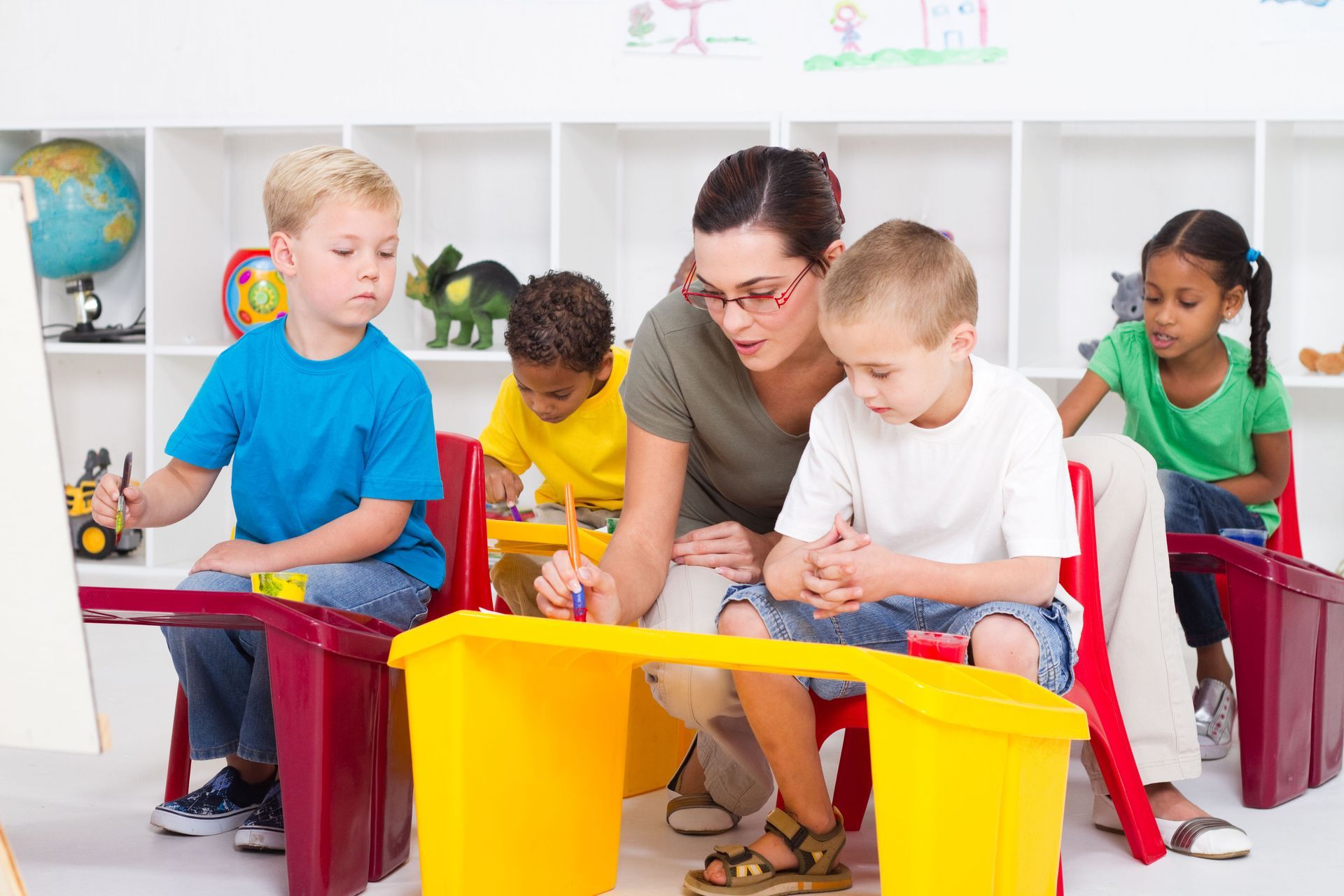October 25, 2025
Daycare centers play a crucial role in supporting children’s overall growth. They offer a structured environment that promotes social, emotional, cognitive, and physical development. By engaging in daily activities and routines, children build essential skills that prepare them for future learning. This article will examine the different ways daycare centers foster a child’s comprehensive development.
Fostering Social Skills
Daycare centers are bustling environments that offer numerous opportunities for children to engage with their peers. Through daily interactions, children learn important social skills such as sharing, taking turns, and cooperating with others. This peer interaction is crucial as it lays the foundation for developing friendships and building social networks. The collaborative games and group projects in daycare help children develop communication skills and the ability to function in a team.
In any group setting, conflicts are bound to arise, and daycare centers serve as ideal grounds for teaching conflict resolution. Through guided experiences, children learn how to express their feelings calmly and find peaceful solutions to disagreements. Caregivers play an essential role by modeling positive interactions and guiding children through the conflict resolution process. This guidance helps children recognize their emotions and learn to compromise, fostering an environment where cooperation flourishes.
Daycare centers emphasize the importance of teamwork through various group activities and projects. Whether it's building a block tower together or participating in a group art project, children learn how to collaborate effectively. These activities teach children to listen to others' ideas, take initiative, and contribute to a collective goal. The ability to work well with others is a crucial skill that will benefit children in school and future workplaces.
Supporting Emotional Development
With the support of attentive caregivers, children at daycare centers learn essential emotional regulation skills. Children are assisted in identifying their emotions and understanding that all feelings are valid. Through structured play and discussions, caregivers teach children calming strategies, such as deep breathing or counting, to manage intense feelings. This nurturing environment encourages children to reflect on their emotions and learn to respond appropriately, rather than react impulsively.
Daycare centers offer a supportive environment that fosters the development of self-esteem. Caregivers praise children's efforts and achievements, reinforcing their sense of competence and worth. Activities that allow children to take risks, such as trying new tasks or sharing their ideas, build their confidence. By encouraging self-expression and celebrating individual strengths, daycare centers help children develop a positive self-image.
Consistent caregiving is vital for establishing secure attachments in young children. Daycare centers provide a stable environment where children can form trusting relationships with caregivers, who serve as secondary attachment figures. These strong bonds offer emotional security, allowing children to explore their surroundings while knowing they can return to a trusted adult for comfort and support. According to Zero to Three, a 3-year-old’s brain is twice as active as an adult brain, making the stability and security provided by daycare even more crucial during this period of rapid development.
Enhancing Cognitive Ability
Daycare centers introduce children to structured learning activities that foster cognitive development and prepare them for future academic success. The curriculum includes age-appropriate modules that stimulate curiosity and promote critical thinking. Activities such as puzzles, science experiments, and interactive learning games engage children and enhance problem-solving skills. The guided exploration of various topics encourages children to ask questions and seek answers, fostering a love of learning.
Daycare centers emphasize the development of problem-solving skills through interactive and exploratory activities. Children are encouraged to tackle challenges independently and collaboratively, enhancing their critical thinking abilities. Activities like building with blocks, sorting objects, and engaging in pretend play provide opportunities for creative problem-solving. Caregivers guide children through the process of identifying problems, brainstorming solutions, and evaluating outcomes. As a result, children become confident and competent problem solvers, prepared to navigate the complexities of the world.
Daycare centers provide abundant opportunities for creative exploration through artistic and imaginative play. Activities such as painting, drawing, and role-playing stimulate children's creativity and self-expression. Caregivers encourage children to explore their interests and experiment with various materials, fostering a sense of curiosity and discovery. Through imaginative play, children develop cognitive flexibility and cultivate their problem-solving skills. Creative exploration in daycare allows children to think outside the box and embrace new possibilities, fostering innovative thinkers.
Promoting Physical Growth
Daycare centers prioritize the enhancement of gross motor skills through activities that involve running, jumping, and climbing. Outdoor playtime provides children with opportunities to engage in physical activities that promote muscle development and coordination. Caregivers organize games and obstacle courses that encourage children to use their whole bodies, improving balance and control. By encouraging active play, daycare centers help children develop stamina and physical fitness, contributing to overall well-being.
Daycare centers focus on developing fine motor skills through activities that require precision and dexterity. Children engage in tasks like cutting paper, building with blocks, and threading beads, which strengthen hand-eye coordination. Arts and crafts projects offer opportunities for creative expression while honing fine motor skills. Caregivers guide children through various activities, providing the support and encouragement needed to master these skills. As children improve their dexterity, they gain confidence in performing tasks that require intricate movements.
Outdoor play and exploration are integral components of daycare centers, providing children with opportunities for growth and discovery. Through interactions with nature, children learn to appreciate the environment and embrace the joys of outdoor play. Caregivers facilitate activities such as nature walks, gardening, and exploratory play, encouraging children to observe and engage with the world around them. Outdoor play promotes physical health, emotional well-being, and cognitive development. These experiences contribute to a holistic approach to child development, nurturing well-rounded individuals.
Establishing Routine and Structure
Daycare centers provide a structured environment that emphasizes the importance of routine in children's lives. Consistent schedules create a sense of predictability and security, enabling children to focus on learning and exploration. Caregivers establish routines for mealtime, play, and rest, promoting a balanced and organized environment. The predictability of daycare routines also helps children develop self-regulation skills, preparing them for future transitions. As children adapt to these routines, they gain an understanding of time management and the importance of organization.
Daycare centers introduce children to basic time management concepts, teaching them to transition between activities efficiently. The structured schedule helps children understand the concepts of time, enabling them to anticipate and prepare for upcoming tasks. Transitioning between activities fosters adaptability and resilience, essential skills for future success. Caregivers model time management and encourage children to participate in establishing a daily rhythm, fostering independence and agency. Through these experiences, children learn to prioritize tasks and manage their time effectively.
Daycare centers nurture independence by encouraging children to make decisions and develop self-sufficiency. Activities such as dressing themselves, choosing snacks, and selecting play activities foster autonomy. Caregivers provide a supportive environment, allowing children to practice decision-making and problem-solving within a safe framework. By promoting independence, daycare centers empower children to take ownership of their actions and learn from their experiences. As a result, children build confidence in their abilities, fostering a proactive and capable mindset.
Daycare centers provide a multi-faceted environment that supports the comprehensive development of children, preparing them for their future educational and social endeavors. With a balanced approach to growth in social, emotional, cognitive, and physical domains, and strong parental involvement, daycare centers help lay a robust foundation for children's continued success. Get in touch with Empower Kidz Drop-In for more information today.



